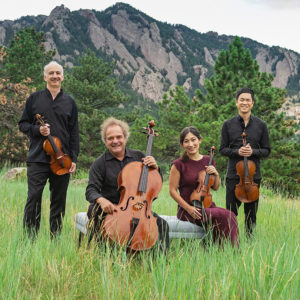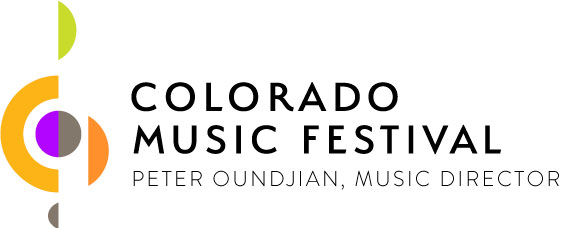Story by Kyle MacMillan | Photo by Mariah Tauger
Scan the list of works by composer Gabriela Lena Frank and you won’t find any called Flute Concerto No. 2 or String Quartet No. 4. Instead, her works sport evocative titles like Requiem for a Magical America, Chronicles of the Picaflor, or Ghosts in the Dream Machine.
Put simply, the Grammy Award-nominated California composer likes to tell stories. “Abstract music — I could play it as a pianist, but I couldn’t write it,” she said in a recent interview for the Festival. “I had to have something happening that was more cinematic in my head.”
And so it is sure to be with her latest piece, an in-progress commission from the Colorado Music Festival that will be premiered in the summer of 2024 by the celebrated Takács Quartet and the string orchestra and two percussionists from the Festival’s orchestra, with Music Director Peter Oundjian conducting.

Takács Quartet | Image by Amanda Tipton Photography
Though the Takács, quartet-in-residence at the University of Colorado at Boulder, will be spotlighted in this 25-minute piece, Frank does not consider it a concerto like Louis Spohr’s 1845 work for string quartet and orchestra.
Instead, she calls it a concertino, in which the foursome will be embedded in the orchestra and serve as principals. At times, they will lead their orchestral sections, and at others, they will perform as soloists – a “back and forth” that she likes.
The work, which Frank hopes to finish by the end of February, does not have a title yet, but she is sure it will draw on the South American musical idioms that have suffused many of her works. “I hope to celebrate the individual personalities of the four players,” she said. “I imagine it as a multi-movement work that’s designed to really capitalize on their gifts, but it’s meant to sit well with the listeners even if it challenges them.”
The seed for this commission came through a longtime friendship between Frank and Harumi Rhodes, who joined the Takács in 2018 as second violinist. Rhodes is featured on a 2013 album of Frank’s chamber music titled Compadrazgo.
The composer traces her love of storytelling to her parents, who are both prodigious readers. Frank’s father was a Mark Twain scholar at the University of California, Berkeley, and he would assign her to write short stories as “homework,” and they would read Shakespeare plays and Sherlock Holmes stories together.
She even considered becoming a fiction writer. But when she attended the prep division of the San Francisco Conservatory of Music, she discovered that composition, which for her had always been a “private enjoyment,” was actually a discipline that she could pursue as a career. “It just changed everything for me, and I decided to go in that direction,” Frank said. “It was more novel, more unusual than writing stories or fiction.”
After earning her bachelor and master’s degrees from Rice University, she went on to gain a doctorate in composition from the University of Michigan in 2001. Along the way, she realized that few composers shared her mixed cultural background — an American father of Lithuanian and Jewish descent and a mother of Peruvian and Chinese ancestry — and she often draws on that cultural heritage, particularly the latter, in her works.
In addition to dining on Peruvian food growing up and hearing her mother’s childhood stories, Frank began traveling to South America in her early 20s so she could see that world through her mother’s eyes. Her mother is one of 14 sisters and brothers, so Frank has a large extended family in Peru. “It’s kind of irresistible,” he said. “I have this way-in to a country that I wasn’t born in.”
Although she is an admirer of 20th-century Hungarian composer Béla Bartók, who famously traveled the rural areas of his country to collect folk melodies that he incorporated into his compositions, she makes clear she is no ethnomusicologist. Instead, she sees herself as “cultural witness” and her South American excursions as “personal exploration.”
One of Frank’s most frequently performed works is Leyendas: An Andean Walkabout (2001), which came on the heels of her first extended trip to Peru and incorporates Andean folk elements. Originally written as a string quartet, the composer created a later version for string orchestra. “I felt like all my trips were walkabouts where I didn’t have a plan, and I would just see different festivals and different towns,” she said.
In 2017, Frank founded an eponymous academy of music, which literally started in her living room near the northern California town of Boonville, and it has given a boost to dozens of up-and-coming composers. The school’s impetus sprang from a harrowing encounter at a truckstop on a trip to Angel Fire, N.M., during the heated climate of the 2016 election. Apparently based on her appearance, Frank was accosted and shoved to the ground by a gun-carrying man.
“Finally, it hit me how bad things were getting — where he felt like he could do that to somebody who looked like I did,” he said. More than just write her music, Frank decided she needed to enable others’ stories. “This is what makes America great. It always has,” she said.
She invited 19 young composers that she had met one way or another and 12 mentors to her home for a series of residencies with Frank and her husband covering all expenses. She had no idea if the concept would work or if she would enjoy the process.
“I was hooked from day one,” she said. “People just showed up writing chamber music for one another and we workshopped it. From that simple activity, it grew so quickly.” The academy is now supported by the Mellon Fund and private donors. Its scope has expanded to include commissions and other activities, including a climate-focused program called Composing Earth.
At 51, Frank has become one of this country’s most recognized composers, receiving multiple honors including the 2020 Heinz Award, which came with a $250,000 cash prize, a portion of which she devoted to her creative academy.
She will complete her tenure as composer-in-residence in 2025 at the esteemed Philadelphia Orchestra, and her first opera, El último sueño de Frida y Diego (The Last Dream of Frida and Diego) received its third set of performances in November and December at the Los Angeles Opera.
She has ideas for additional operas, an ideal form for an innate storyteller, but is not sure what she will pursue next in that form. “We’ll see what bites first,” she said. For now, she is focused on her Colorado Music Festival commission. “It is,” she said, “the main project on my desk.”
The Colorado Music Festival and Takács Quartet perform Gabriela Lena Frank’s world premiere commissioned “concertino” on Sunday, July 21. Details & tickets >
